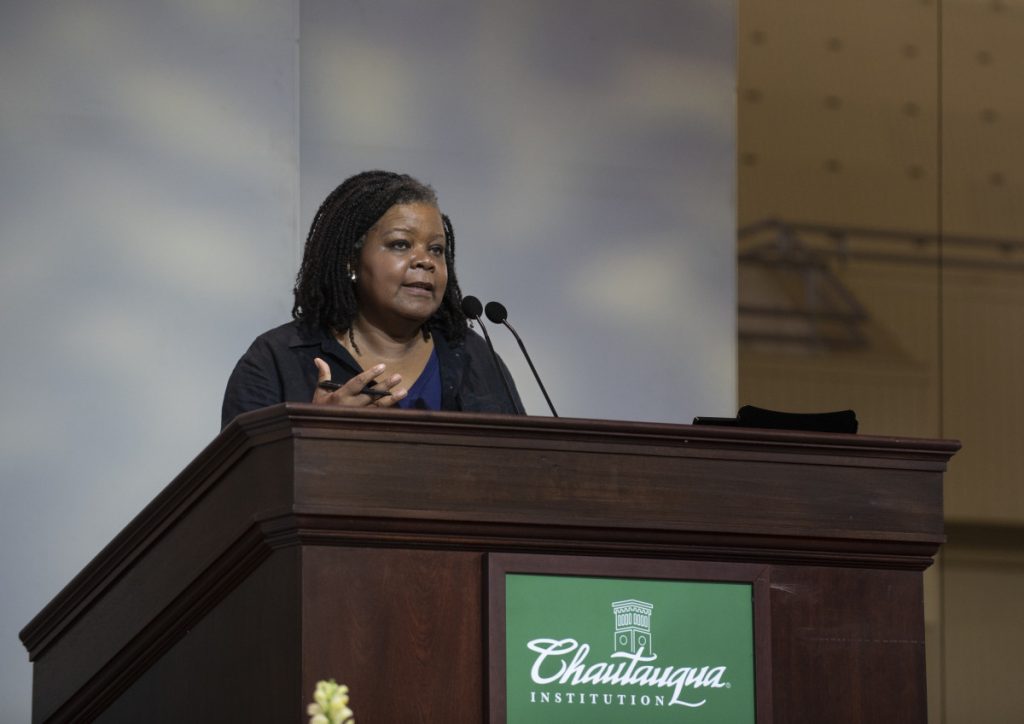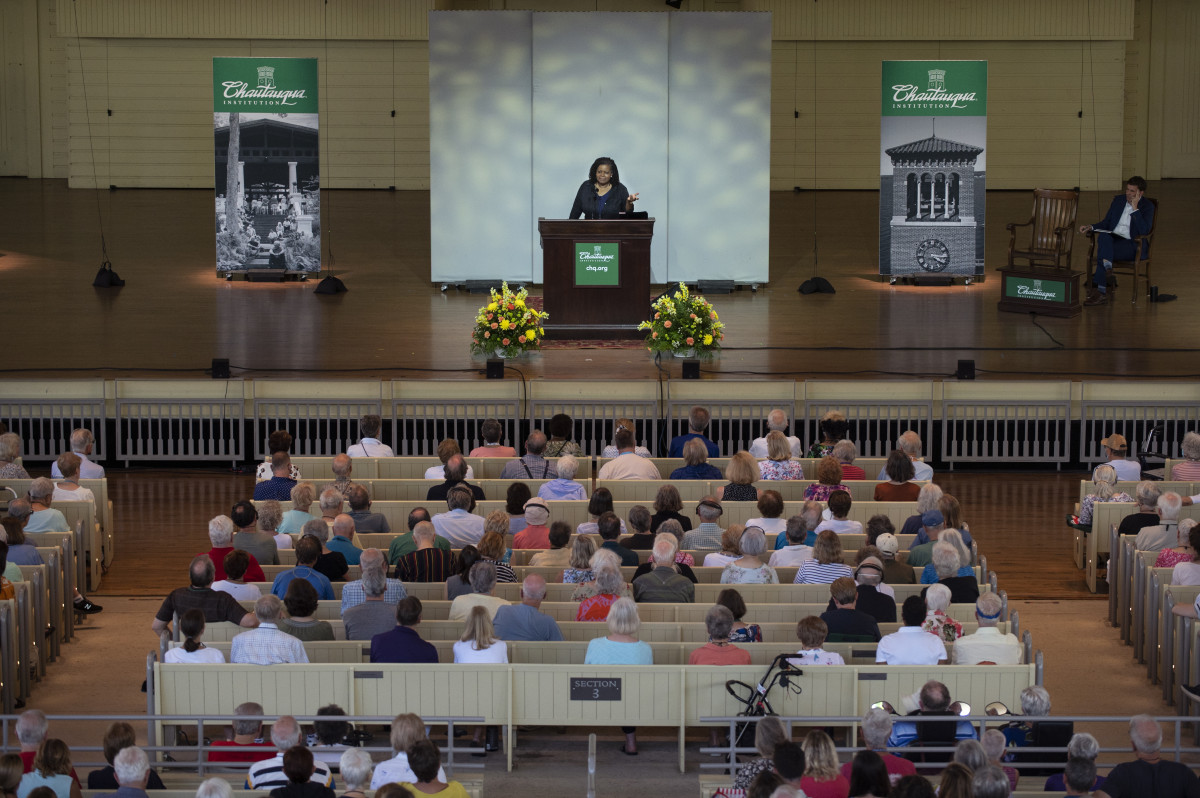Annette Gordon-Reed opened her lecture with a discussion of her experiences: her experiences as an author, a historian and an elementary-aged student desegregating schools.
Gordon-Reed is an author of numerous books, one of which — 2009 Chautauqua Literary and Scientific Circle pick The Hemingses of Monticello: An American Family — won the Pulitzer Prize in History and the National Book Award in 2008, along with 14 other prizes. Her most recent book, On Juneteenth, was the impetus for her 10:45 a.m. Tuesday, July 19, morning lecture in the Amphitheater, part of the Chautauqua Lecture Series theme “The Future of History.”
“I had not originally planned to write a book about Juneteenth or about Texas, but my editor had been after me for a number of years to write a big book about Texas, and I had resisted that. … But he thought that writing about Texas would be a good thing,” Gordon-Reed said.
Now the Carl M. Loeb University Professor at Harvard, Gordon-Reed grew up in Texas in the 1960s before attending Dartmouth College and then Harvard Law School. She has remained on the East Coast ever since and has frequently had to explain what Texas is like.
During the start of the COVID-19 pandemic, Gordon-Reed’s editor wanted her to write a small book on Texas, “a short book, 30,000 words or so,” she said.
“I would talk about myself, which I don’t typically do, but I would try to explain the state through my family’s history,” she said.
What would have been around a 60-page book, On Juneteenth bloomed into 152 pages. Juneteenth celebrates June 19, 1865, when the last enslaved people, in Galveston, Texas, were liberated by the Union under General Granger’s Order No. 3. Gordon-Reed’s book discusses Juneteenth, both its history and how its history interweaves and impacts Gordon-Reed’s life and the lives of her ancestors.
Juneteenth has always been celebrated by Black Texans, she said, and the state of Texas made it a holiday in 1980.
“It’s something of long-standing (tradition), and people there understand what it’s supposed to be about and why it’s important,” she said. “Now, with it as a federal holiday, we have an opportunity, I think, to sort of change the narrative: to think about what can be done to move things forward, despite what is happening in these legislatures and in school boards and in libraries.”
Gordon-Reed discussed how public libraries, which were an “oasis” to her growing up, are being targeted by efforts to ban books or to close their doors because of the information they give people access to.
“It’s depressing to me to think that we’re at a moment now where people don’t understand that,” she said. “That always struck me as the place that you could not violate. That this was a place that everybody understood why it was important to let people seek knowledge and to learn freely.”

School was another area where she learned, specifically about Texas, as she took classes on strictly Texan history in fourth grade, seventh grade and high school. When learning about the history of Texas, she noted that the constitution of the Republic of Texas could not be ignored.
“The American Constitution kind of downplays slavery. ‘Persons held to service.’ It doesn’t want to use the word ‘slavery,’ ” she said. “You can see that even though (the Founders) were slaveholders, many of them, there was a discomfort with this idea of openly talking about the institution. The Texas constitution, no holds barred, talks about slavery and people of African dissent not becoming citizens. You can’t get around that.”
She said that history has to be taught fully, but the story of Texas does not begin and end with its constitution.
“We’re not hostage to that history,” Gordon-Reed said. “That may have been what they believed then, but we believe something different now,” she said.
Many white parents take issue with teaching history, she shared, because they worry their kids will lose the view of Texas being their home. Instead, they wish to avoid this uncomfortable narrative.
“There’s nothing wrong with feeling bad. Sometimes feeling bad could be the first step to thinking about doing things differently,” she said.
While parents might think they are helping their kids, Gordon-Reed believes they are hurting them.
“Young people don’t like to be lied to. Because when they find out that they’ve been lied to, that breeds cynicism, and that isn’t what you need in a democratic republic,” she said. “You need people who can be idealistic. You need people who can trust. Skepticism is good, but cynicism and nihilism is not the answer in the kind of society that was supposed to be the American experiment.”
Part of the work Gordon-Reed does as a historian is to make sure people are not lied to. She does this by sharing the complex stories of people, such as Thomas Jefferson.
The New-York Historical Society, where Gordon-Reed is a board member, was given a statue of Jefferson originally on display in the City Council Chamber of New York. It was moved to the New-York Historical Society so it could be historically contextualized.
Their goal was to “explain his contributions, but at the same time talk about the side of him that is less than admirable or not admirable at all, I should say — Jefferson the slaveholder — and put those things together,” Gordon-Reed said.
She frequently debates and discusses the removal of statues or monuments, especially those erected to honor the Confederacy.
“They were put up at a particular moment. Many of them were put up in the ’20s, in the ’30s, as people were beginning to fight for civil rights. It was a message,” she said. “Some of them actually had, on the bottom of them, ‘white supremacy.’ … They’re not talking about just honoring the war dead. It’s saying who is in control of this society.”
Because these statues were erected in a time when Black people either had no right to vote, or a very limited right to vote, not every member of the community was able to have a say on the statues being erected, she said.
“You can’t say that this was a choice that was made by the community. So for me, those kinds of monuments, if people make the decision that they want them gone, then, to me, that’s fine,” she said. “That’s the correct choice to make.”
Gordon-Reed said she sees a difference in monuments of the founding generation and those made of members of the Confederacy.
“I think there’s a difference between having fought to create the United States and having fought to destroy the United States,” she said. “Those are two different things.”
But she does not believe hero worship is correct, either. People must look at historical figures like Jefferson realistically, and she thinks that younger generations are getting better and better at that.
“I think as we move forward here with a more inclusive understanding of what our history is and how we should commemorate it, there will be a more realistic understanding about individuals,” she said.
True inclusivity, she believes, allows for all people to speak up when they are uncomfortable. Gordon-Reed, who desegregated her own public schools in Texas and went to Dartmouth when it first became co-ed, had positive experiences at those schools, but her experience does not look like those of women and/or students of color now. These students are speaking up at universities like Yale and voicing their discontent, and Gordon-Reed said that is because those students are comfortable there.
“We have to think about the changes that have to be made internally as people become comfortable in this particular space. So that’s going to cause problems, and as I suggested before, a lot of the things that are happening now, there’s a backlash against the effort,” she said. “… The hope is that the good things will be kept and the bad things will go away.”
Gordon-Reed gave the example of Jefferson writing to James Madison that “the earth belongs to the living.” Because of this, every generation is able to shape the culture and thought of their time. Gordon-Reed believes this applies to the removal of statues like Jefferson’s.
“Generations of people are saying maybe we want other heroes, maybe other people in addition to you, but maybe your monument can go somewhere else,” she said. “I think (Jefferson) would probably understand that as a concept.”
History is constantly moving forward, leaving historians like Gordon-Reed wondering what the future holds.
“We’re in a moment now where people are trying to figure all of this out and decide which direction that we want to go in,” she said. “I am actually optimistic. I mean, I have to be optimistic. I don’t have a choice of being optimistic.”
This optimism comes from her research for On Juneteenth. After emancipation, four Black men in Houston pooled their savings to purchase land to celebrate. This reminds Gordon-Reed that we must believe in a future full of hope and take actions that show we have faith in that future.
“I don’t really feel that I have the luxury of despair, the luxury of being anything other than optimistic, because they had optimism, and they had faith that things would get better and that things would go forward,” Gordon-Reed said. “So even in my most depressed moments about where we are, I want to maintain that kind of faith, because they kept faith and hoped that future generations of people would have opportunities that they never had.”
This impacts Gordon-Reed as she looks to the future.
“I’m going to make something of that by keeping my heart open, keeping my mind open, and having faith that the American experiment,” she said, “that the words of the Declaration, that we take to be our creed … will be something that we will remember as part of our history that informs our present and gives us hope for the future.”





